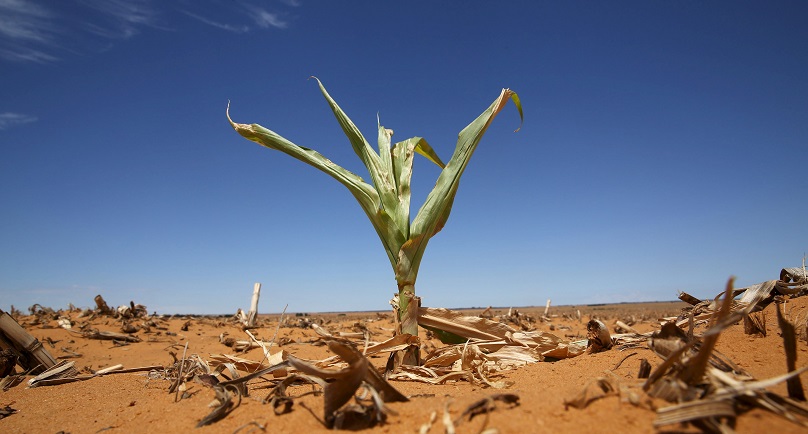Image: A maize plant is seen among other dried maize at a field in Hoopstad, a maize-producing district in the Free State province, South Africa, January 13, 2016. REUTERS/Siphiwe Sibeko
By Ed Stoddard
JOHANNESBURG (Reuters) – South Africa suffered its driest year on record in 2015, the national weather service said on Thursday, as a drought that has threatened the vital maize crop and hit economic growth showed no sign of abating.
Average rainfall was 403 mm, about a third less than the 608 mm annual average and the driest since records began in 1904, the service added.
The agricultural sector is being hammered by weeks of heat waves that have scorched grazing land, forcing livestock owners to kill or sell animals.
The 9 billion rand ($540 million) citrus industry, the second-largest exporter in the world, has been hit by low dam levels and water restrictions, industry sources say.
Africa’s most advanced economy, usually a maize exporter, may need to import as much as 5 million tonnes this year, roughly half its requirements, the country’s largest producer group said last week.
Scientists say the drought is being exacerbated by an exceptionally strong El Nino weather pattern, a warming of ocean surface temperatures in the eastern and central Pacific that occurs every few years with ripple effects around the globe.
The dry, hot conditions are expected to persist until the start of the southern hemisphere autumn in April or May.
El Nino events typically bring drier conditions to Southern Africa and wetter ones to East Africa.
Ominously, climate change models suggest this trajectory may become the norm, with Africa’s southern, sub-tropical zone becoming warmer and drier while more rainfall comes to the east and tropical regions, according to forecasts from South Africa’s Council for Scientific and Industrial Research.
“Warming is projected to occur (in Africa) during the 21st century, with plausible increases of 4–6 °C over the subtropics and 3–5 °C over the tropics by the end of the century,” a team of scientists said in a study recently published in the online journal Environmental Research Letters last year.
(Editing by Andrew Heavens)
Copyright 2015 Thomson Reuters. Click for Restrictions.


